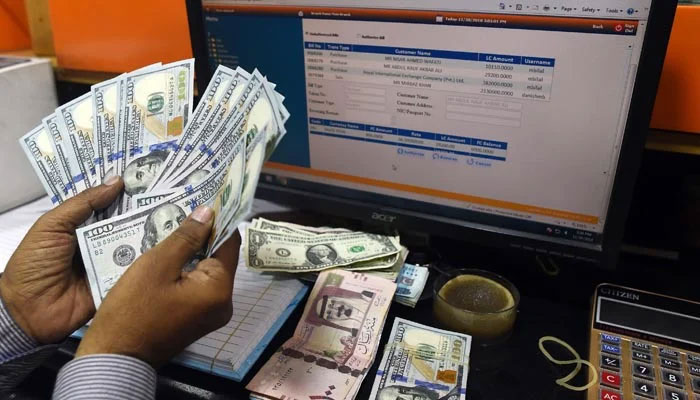News Analysis: On the brink
Pakistan’s economy is currently in a precarious state, as it is facing a significant need for imports valued at approximately $60 billion
ISLAMABAD: On the brink refers to a situation approaching a dangerous or critical stage. The point of no return refers to a point in the process beyond which it becomes impossible to change the outcome without external intervention. A tipping point is a critical point at which a significant change occurs, often rapidly and unexpectedly.
Pakistan’s economy is currently in a precarious state, as it is facing a significant need for imports valued at approximately $60 billion, including wheat, petrol, diesel, crude oil, life-saving drugs, tea, lentils, cooking oil, cotton, coal, and LNG. Additionally, the country’s gross external financing requirements for this year are estimated to be around $30 billion, and it will need to pay back $75 billion in the next three years. According to the State Bank of Pakistan (SBP), as of January 6, the country’s net reserves were only $4.3 billion.
Question: Have we reached the point of no return? Answer: Yes, the economy has reached a point where it is now impossible to change the outcome without significant external financial intervention.
Question: Have we reached a tipping point? Answer: Yes, the economy has reached a critical point where a significant, rapid, and unexpected change is imminent.
In 2019, Pakistan’s Ministry of Finance designed a program to stabilize the economy and address structural imbalances. The International Monetary Fund (IMF) supported the program with a 39-month Extended Fund Facility (EFF) amounting to SDR 6.64 billion. The program includes the adoption of an ‘exchange rate realism’ approach, the implementation of a comprehensive strategy for reducing circular debt, and closing the fiscal gap through increasing revenue or decreasing expenditures.
The first step towards bringing Pakistan’s economy back from the brink is seeking external financial assistance. The IMF is the only international financial institution that conducts regular Article IV consultations with member-countries in order to monitor their economic situation and provide policy advice. Assistance from China, Saudi Arabia or the UAE is neither a substitute nor an alternative to the IMF.
Pakistan will be facing a shortage of diesel and petrol, with only 30 and 18 days of supply remaining respectively. Additionally, the country’s hospitals are in need of surgical, medical, and diagnostic equipment.
Furthermore, there is a shortage of insulin for diabetes patients, as 33 million Pakistanis are affected by the disease. The economy is on the brink, and there is currently no clear plan or political direction for addressing these issues.
A typical state is typically characterised by three key elements: politics, security policy, and economic policy. Pakistan’s trajectory is towards becoming an ‘abnormal state’ where there’s nothing but politics; no security policy and no economic policy.
-
 Giant Tortoise Reintroduced To Island After Almost 200 Years
Giant Tortoise Reintroduced To Island After Almost 200 Years -
 Eric Dane Drops Raw Confession For Rebecca Gayheart In Final Interview
Eric Dane Drops Raw Confession For Rebecca Gayheart In Final Interview -
 Trump Announces New 10% Global Tariff After Supreme Court Setback
Trump Announces New 10% Global Tariff After Supreme Court Setback -
 Influencer Dies Days After Plastic Surgery: Are Cosmetic Procedures Really Safe?
Influencer Dies Days After Plastic Surgery: Are Cosmetic Procedures Really Safe? -
 Eric Dane Confesses Heartbreaking Regret About Daughters' Weddings Before Death
Eric Dane Confesses Heartbreaking Regret About Daughters' Weddings Before Death -
 Nicole 'Snooki' Polizzi Reveals Stage 1 Cervical Cancer Diagnosis
Nicole 'Snooki' Polizzi Reveals Stage 1 Cervical Cancer Diagnosis -
 Hilary Duff’s Son Roasts Her Outfit In New Album Interview
Hilary Duff’s Son Roasts Her Outfit In New Album Interview -
 Alexandra Daddario, Andrew Form Part Ways After 3 Years Of Marriage
Alexandra Daddario, Andrew Form Part Ways After 3 Years Of Marriage -
 Eric Dane Rejected Sex Symbol Label
Eric Dane Rejected Sex Symbol Label -
 Avan Jogia Says Life With Fiancee Halsey Feels Like 'coming Home'
Avan Jogia Says Life With Fiancee Halsey Feels Like 'coming Home' -
 Kate Middleton's Role In Handling Prince William And Harry Feud Revealed
Kate Middleton's Role In Handling Prince William And Harry Feud Revealed -
 Tucker Carlson Says Passport Seized, Staff Member Questioned At Israel Airport
Tucker Carlson Says Passport Seized, Staff Member Questioned At Israel Airport -
 David, Victoria Beckham Gushes Over 'fiercely Loyal' Son Cruz On Special Day
David, Victoria Beckham Gushes Over 'fiercely Loyal' Son Cruz On Special Day -
 Taylor Swift Made Sure Jodie Turner-Smith's Little Girl Had A Special Day On 'Opalite' Music Video Set
Taylor Swift Made Sure Jodie Turner-Smith's Little Girl Had A Special Day On 'Opalite' Music Video Set -
 Eric Dane Says Touching Goodbye To Daughters Billie And Georgia In New Netflix Documentary
Eric Dane Says Touching Goodbye To Daughters Billie And Georgia In New Netflix Documentary -
 Channing Tatum Reveals What He Told Daughter After Violent Incident At School
Channing Tatum Reveals What He Told Daughter After Violent Incident At School




